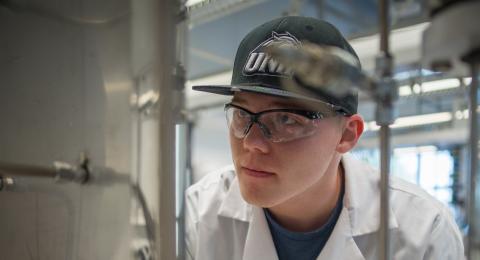The Chemical Engineering: Bioengineering Option offers an immersive experience in studying transformation and transfer of energy and materials across biological systems, biotechnology, pharmaceuticals and more. With hands-on experience in our labs and guidance from dedicated faculty, you'll develop essential technical skills for diverse career paths or graduate studies. There are research and internship opportunities with some of the world’s leading companies in their field, designed to prepare you utilize sustainable solutions to tackle societal challenges with a focus on large-scale production of high-value medicines, food and beverage, pharmaceutical, biomedical, genetic engineering, and healthcare products.
What is the bioengineering option in chemical engineering?
In the bioengineering option, the required courses deal with the application of basic biological sciences and chemical engineering principles to the design and operation of large-scale bioprocesses for the production of high-value medicinal products, food and beverage, pharmaceutical, biomedical, genetic engineering products, and healthcare products. The elective courses permit the student to study topics of special interest in more depth or gain a broader perspective in bioengineering or some closely related subjects such as biochemistry or biotechnology experience in manufacturing or research.
Why study chemical engineering at UNH?
You’ll gain a solid foundation of engineering principles through challenging courses and hands-on learning in our state-of-the-art laboratories alongside award-winning faculty. The considerable number of electives in the curriculum offers flexibility so you can design a program that meets your needs and interests.
Potential careers
- Biotechnology
- Biochemical and biomedical engineering
- Pharmaceuticals and medicine
- Plastics and textiles
Curriculum & Requirements
Under this option, the required courses deal with the application of basic biological sciences and chemical engineering principles to the design and operation of large-scale bioprocesses for the production of high-value medicinal, food and beverage, pharmaceutical, biomedical, genetic engineering, and health care products. The elective courses permit the student to study topics of special interest in more depth or gain a broader perspective in bioengineering or some closely related subjects such as biochemistry or biotechnology experience in manufacturing or research. Three courses are required, and an additional course of at least three credits should be selected from the electives list. Students interested in the bioengineering option should declare their intention to the department faculty during the sophomore year.
The Chemical Engineering program (B Sci in Chemical Engineering) is accredited by the Engineering Accreditation Commission of ABET, https://www.abet.org, under the General Criteria and the Program Criteria for Chemical, Biochemical, Biomolecular and Similarly Named Engineering Programs.
Sample Degree Plan
This sample degree plan serves as a general guide; students collaborate with their academic advisor to develop a personalized degree plan to meet their academic goals and program requirements.
| First Year | ||
|---|---|---|
| Fall | Credits | |
| CHBE 400 | Chemical and Bioengineering Lectures | 1 |
| CHEM 405 | Chemical Principles for Engineers 3 | 4 |
| ENGL 401 | First-Year Writing 1 | 4 |
| MATH 425 | Calculus I 2 | 4 |
| Discovery Program Electives 6 | 4 | |
| Credits | 17 | |
| Spring | ||
| MATH 426 | Calculus II | 4 |
| PHYS 407 | General Physics I 3 | 4 |
| Discovery Program Electives (2) 6 | 8 | |
| Credits | 16 | |
| Second Year | ||
| Fall | ||
| CHBE 501 | Material Balances | 3 |
| CHEM 683 | Physical Chemistry I | 3 |
| CHEM 685 | Physical Chemistry Laboratory | 2 |
| MATH 527 | Differential Equations with Linear Algebra | 4 |
| PHYS 408 | General Physics II | 4 |
| Credits | 16 | |
| Spring | ||
| CHBE 502 | Energy Balances 4 | 3 |
| CHEM 684 | Physical Chemistry II | 3 |
| CHEM 686 | Physical Chemistry Laboratory | 2 |
| MATH 740 or MATH 644 | Design of Experiments I 6 or Statistics for Engineers and Scientists | 4 |
| Discovery Program Elective 6 | 4 | |
| Credits | 16 | |
| Third Year | ||
| Fall | ||
| CHBE 601 | Fluid Mechanics and Unit Operations | 3 |
| CHBE 603 | Applied Mathematics for Chemical Engineers | 4 |
| CHEM 651 | Organic Chemistry I | 3 |
| CHEM 653 | Organic Chemistry Laboratory | 2 |
| CHBE 766 | Biomaterials | 4 |
| Credits | 16 | |
| Spring | ||
| CHBE 602 | Heat Transfer and Unit Operations | 3 |
| CHBE 604 | Chemical Engineering Thermodynamics | 3 |
| CHBE 612 | Chemical Engineering Laboratory I | 3 |
| CHEM 652A | Organic Chemistry II | 3 |
| CHBE 761 | Biochemical Engineering | 4 |
| Credits | 16 | |
| Fourth Year | ||
| Fall | ||
| CHBE 703 | Mass Transfer and Stagewise Operations | 3 |
| CHBE 707 | Chemical Engineering Kinetics | 3 |
| CHBE 713 | Chemical Engineering Laboratory II | 3 |
| CHBE 752 | Process Dynamics and Control | 4 |
| Discovery Elective 6 | 4 | |
| Credits | 17 | |
| Spring | ||
| CHBE 614 | Separation Processes | 3 |
| CHBE 708 | Chemical Engineering Design 5 | 4 |
| CHBE 651 | Biotech Experience/Biomanufacturing | 4 |
| Bioengineering Option Elective | 3-4 | |
| Discovery Elective 6 | 4 | |
| Credits | 18-19 | |
| Total Credits | 132-133 | |
- 1
ENGL 401 First-Year Writing satisfies the Discovery Foundation Writing Skills category.
- 2
MATH 425 Calculus I satisifies the Discovery Foundation Quantitative Reasoning category.
- 3
PHYS 407 General Physics I or CHEM 405 Chemical Principles for Engineers satisfies the Discovery Physical Science (with lab) category.
- 4
CHBE 502 Energy Balances satisfies the Discovery Inquiry requirement.
- 5
CHBE 708 Chemical Engineering Design satisfies the Discovery Capstone Experience/Course.
- 6
Chemical Engineering students do not have to take a course in the Discovery ETS category since they satisfy this requirement through a combination of courses in the curriculum.
Degree Requirements
All Major, Option and Elective Requirements as indicated.
*Major GPA requirements as indicated.
Major Requirements
| Code | Title | Credits |
|---|---|---|
| Required Courses | ||
| CHBE 400 | Chemical and Bioengineering Lectures | 1 |
| CHBE 501 | Material Balances | 3 |
| CHBE 502 | Energy Balances | 3 |
| CHBE 601 | Fluid Mechanics and Unit Operations | 3 |
| CHBE 602 | Heat Transfer and Unit Operations | 3 |
| CHBE 603 | Applied Mathematics for Chemical Engineers | 4 |
| CHBE 604 | Chemical Engineering Thermodynamics | 3 |
| CHBE 612 | Chemical Engineering Laboratory I | 3 |
| CHBE 614 | Separation Processes | 3 |
| CHBE 651 | Biotech Experience/Biomanufacturing | 4 |
| CHBE 703 | Mass Transfer and Stagewise Operations | 3 |
| CHBE 707 | Chemical Engineering Kinetics | 3 |
| CHBE 708 | Chemical Engineering Design | 4 |
| CHBE 713 | Chemical Engineering Laboratory II | 3 |
| CHBE 752 | Process Dynamics and Control | 4 |
| CHBE 761 | Biochemical Engineering | 4 |
| CHBE 766 | Biomaterials | 4 |
| CHEM 405 | Chemical Principles for Engineers | 4 |
| CHEM 683 | Physical Chemistry I | 3 |
| CHEM 684 | Physical Chemistry II | 3 |
| CHEM 685 | Physical Chemistry Laboratory | 2 |
| CHEM 686 | Physical Chemistry Laboratory | 2 |
| CHEM 651 | Organic Chemistry I | 3 |
| CHEM 652A | Organic Chemistry II | 3 |
| CHEM 653 | Organic Chemistry Laboratory | 2 |
| MATH 425 | Calculus I | 4 |
| MATH 426 | Calculus II | 4 |
| MATH 527 | Differential Equations with Linear Algebra | 4 |
| MATH 644 | Statistics for Engineers and Scientists | 4 |
| PHYS 407 | General Physics I | 4 |
| PHYS 408 | General Physics II | 4 |
| Elective Courses | ||
| Select one of the following: | 3-4 | |
CHBE 695 | Chemical Engineering Project | |
CHBE 696 | Independent Study | |
CHBE 714 | Chemical Sensors | |
CHBE 725 | Cell Phenotyping and Tissue Engineering Laboratory | |
CHBE 755 | Computational Molecular Bioengineering | |
CHBE 762 | Biomedical Engineering | |
BMCB 750 | Physical Biochemistry | |
BMCB 751 | Principles of Biochemistry I | |
BMCB 752 | Principles of Biochemistry II | |
| Total Credits | 104-105 | |
Program Learning Outcomes
By the time of graduation, students will have:
- an ability to identify, formulate, and solve complex engineering problems by applying principles of engineering, science, and mathematics.
- an ability to apply engineering design to produce solutions that meet specified needs with consideration of public health, safety, and welfare, as well as global, cultural, social, environmental, and economic factors.
- an ability to communicate effectively with a range of audiences.
- an ability to recognize ethical and professional responsibilities in engineering situations and make informed judgments, which must consider the impact of engineering solutions in global, economic, environmental, and societal contexts.
- an ability to function effectively on a team whose members together provide leadership, create a collaborative and inclusive environment, establish goals, plan tasks, and meet objectives.
- an ability to develop and conduct appropriate experimentation, analyze and interpret data, and use engineering judgment to draw conclusions.
- an ability to acquire and apply new knowledge as needed, using appropriate learning strategies.
Explore Program Details
The bioengineering program seeks to provide an environment and opportunities that enable students to pursue their goals in an innovative program with a diversity of offerings that is rigorous and challenging.
Those interested in the Chemical Engineering: Environmental Engineering Option major may also be interested in the following advanced degrees. Students in the program also have the opportunity to participate in the UNH accelerated master’s program.












